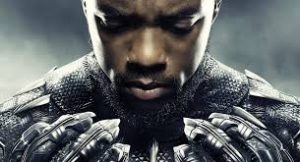The last several years has seen a shift in both the type and the quality of Hollywood films featuring African-Americans. For years, I have felt like there has been a very narrow range of movies featuring the experiences of Black lives and I’m not the only one. I’ve long wished we could see less comedy and trauma/suffering movies and more science fiction or fantasy or period pieces or thrillers. Seeing the wider range of stories and genres covered by the likes of Hidden Figures, Girls Trip, Moonlight, BlacKKKlansman, Straight Outta Compton, and Sorry To Bother You has been a joy. These were all critically acclaimed and financially successful films that centered the experiences of Blacks and cast Black actors in leading roles.
For myself and many African-American moviegoers, one film has stood out from the rest. Not because the others listed (or those absent) are sub-par movies, but rather, because the Black Panther was the kind of movie we have long thirsted for. The first Black superhero of Marvel Comics got to headline the first Black superhero movie from Marvel Studios, with a Black director, a predominately Black cast, diverse presentation of Black bodies, an Afrofuturist aesthetic, complex nuanced characters largely devoid of stereotypes, a rich backstory, and a massive budget. A monumental box office hit, the movie shattered record after record on its way to a final global tally of roughly $1.3 billion. The movie was a critical hit with audiences across the globe, most especially with its target audience: those of African descent.

In a country that has devalued Black lives since it began and has a long history of criminalizing Black bodies, it makes a certain amount of sense that our lives, experiences, and stories are rarely centered in Hollywood. After all, most of the people who have been involved in the industry were socialized in the United States. As such, they have been influenced by and have aided in the perpetuation of stereotypes and prejudicial beliefs about African-Americans. These racial stereotypes are present all throughout the media, including the film industry and can affect the emotions, cognition, and behavior of viewers. Especially worrying is the effect of racial stereotypes on children of color, whose encounters with racism and discrimination can have a detrimental impact on their self-esteem and identity, as well as their physiology (media depictions of racial stereotypes have an impact on adults as well). When a movie like the Black Panther is released, it has an impact, as noted by Yvette Nicole Brown in the Nerdist’s Impact of the Black Panther :
It’s a game changer in a way that I don’t think we can even quantify.”
and Dr. Erlanger Turner in his article on the importance of the movie to the Black community:
Many have wondered why “Black Panther” means so much to the black community and why schools, churches and organizations have come to the theaters with so much excitement. The answer is that the movie brings a moment of positivity to a group of people often not the centerpiece of Hollywood movies. Plus, what we know from the research on RES [racial and ethnic socialization. Read more on that here. –Tony] is that it helps to strengthen identity and helps reduce the likelihood on internalizing negative stereotypes about one’s ethnic group.
As illustrated by the following series of Tweets, Black moviegoers were not the only racial group in 2018 who were impacted by a film that centered their lives and culture:

